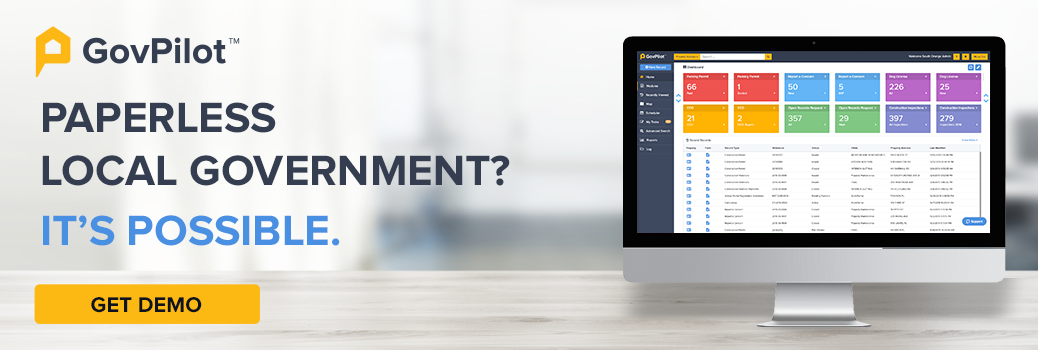Amidst their numerous responsibilities, local government officials must ensure the safety and security of vital information or any stored government data. When using traditional, outdated methods of data storage, including physical storage devices or local on-premises servers, local officials face significant challenges due to the cost, effort, and vulnerability of these antiquated storage solutions.
When storing valuable and sensitive documents, the cloud is significantly safer and more convenient than storing government data in traditional, outdated methods like local file storage. However despite the bountiful benefits of using cloud storage, many people are used to their old way of doing things, skeptical of the new technology, and hesitant to make the switch.
It is vital that local government offices do not allow this potential skepticism from employees to justify the continued use of traditional, unsecure, local file storage.
Read on to learn about the value in utilizing the cloud for document storage and how it simplifies protecting sensitive information, and sharing documents with ease. Follow us as we explore how embracing cloud-based storage will transform operations in your local government, and make accessing documents extremely convenient.
What Is The Cloud?
"The cloud" refers to a network of remote servers that are accessed fully virtually and used to store, manage, and process data. The cloud works far differently than local servers or personal computer storage, which are both extremely unreliable and dangerous for your data storage.
Luckily, cloud storage allows users to store their files and data securely online, making it accessible from anywhere with an internet connection, eliminating the need for physical storage devices and on-premises servers. This method of data storage offers several advantages over traditional storage methods, including scalability, cost-effectiveness, and enhanced security features. Cloud storage makes it possible for your local government employees to access the files and documents they need 24/7 anytime, from anywhere; it is the clear storage choice for municipalities looking to allow government workers the flexibility to view and work with data even from home.
Cloud storage providers such as Microsoft Azure (utilized by GovPilot) typically offer a range of services, such as data backup, file synchronization, and application hosting, making it a versatile and reliable option for storing data.
Learn all about How Local Governments Can & Should Use the Cloud here.
How Does The Cloud Protect Stored Files?
1. Data Encryption
The cloud protects files through data encryption. Data encryption is a process that converts information into a code to prevent corruption via unauthorized access or hackers looking to attack your networks. When files are uploaded to the cloud, they are encrypted using complex algorithms, making them unreadable to anyone without the encryption key. Encryption ensures that even if a data breach occurs, the stolen or accessed files remain secure and inaccessible to the cyber criminal, ensuring citizen’s personal information cannot be stolen.
Additionally, most cloud storage providers offer encryption both at rest (when data is stored) and in transit (when data is being transferred). This ensures end-to-end security with very minimal risks and is a critical component of cloud security.
Check out GovPilot’s Local Government Information Technology Software.
2. Access Control
The cloud uses robust access control mechanisms to protect stored files by regulating who can access protected files and data. Department heads still have full control over which government workers have access to which information is stored in the cloud!
This includes user authentication methods through passwords, multi-factor authentication (MFA), and access permissions that dictate which users or groups have the rights to view, edit, or delete specific files. This multi-layered approach to file protection is the modern solution to protect data from internal risks and combines authentication and authorization, file encryption, and access logs to ensure that any files you store online are protected from unauthorized access.
3. Network Security
Various network security measures are utilized in the cloud to protect your stored files and crucial data. The measures taken to protect this data help ensure that your information is secure both in transit and at rest.
These implemented network security measures are there to protect against all the common threats: unauthorized access and cyber threats, including firewalls, intrusion detection systems (IDS), and intrusion prevention systems (IPS). These security precautions work to monitor and control network traffic to comb for any signs of malicious activity and network policy violations to make sure your data stays safe.
Read about how GovPilot Achieved Highest Recognized Standards With SOC 2 Type 1 Compliance here.
4. Physical Security
While the cloud offers remote servers that can be accessed from anywhere, anytime, the cloud has no physical ties to servers or computer drives. This protects the files and documents stored in the cloud from being damaged in any physical emergency, crisis, or attack.
Data centers where data servers are housed in a physical location are not as safe as cloud storage options because they can burn down, shut down, become corrupt, or face physical damages that can cause users to lose their stored data together.
5. Data Redundancy and Backup
Cloud providers often replicate data across multiple servers in an effort to ensure redundancy and data availability, eliminating the risk that data may be lost forever in an emergency. This redundancy not only enhances performance but also serves as a backup in case of ransomware attacks or technology failures. Your data is always kept in multiples, duplicated so it cannot be fully wiped.
Learn everything about Government Data Storage Types & Considerations for Each here.
Common Challenges of Local File Storage
Let’s face it, local file storage is not as reliable as cloud-based storage. Here are a couple reasons that local file storage presents challenges to users:
-
Limited Accessibility
Traditional physical storage devices such as hard drives or servers limit accessibility to files and data that need to be accessed. These files cannot be remotely accessed, edited, or shared with workers who are not physically present. The accessibility of data held in local storage is limited to its physical ability to be shared, which is only during business hours and often in a paper-based workflow.
Check out GovPilot’s Government Data Analytics Tips & Considerations here.
-
Limited Scalability
Local file storage may have too many limitations in terms of scalability, especially with growing storage needs. It is easy to expand storage on the cloud because the storage space is unlimited! Besides the option to purchase additional hardware for more storage capacity which is costly and time-consuming to maintain, local storage offers very few options to store additional data when needed.
-
Lack of Data Redundancy and Backup
There are any number of physical threats that can compromise a local storage server that holds your valuable government information. Hardware failures, accidental deletions, or disasters like wildfires or unexpected floods can result in permanent data loss if proper backup procedures are not in place. Why take the risk?
It is not worth it to risk losing all of your data on a local server with limited backup capabilities and data redundancy for security, just due to the hesitancy to harness modern technology.
It is obvious that physical servers and local storage of your crucial government information is not that secure; surely not secure enough to protect the citizen data you have been entrusted to protect. Physical theft, unauthorized access to devices or servers, and malware infections can compromise the security of any files you store on local servers.
Consider How Local Governments Can Protect Against Phishing Email Scams.
Reasons To Make The Switch To Cloud Storage
The reasons to switch to cloud storage and undergo a digital transformation in your municipality are innumerable, but here are a few of the key reasons to use the cloud:
-
Less Risks
If you want to eliminate your risks of losing all the data you are entrusted to protect, cloud storage is the way to go. While data backed up on physical servers can be lost forever due to negligence, natural disasters, and emergencies, those are not risks when it comes to the cloud. Cloud-based storage eliminates the risk of physically losing your data and significantly minimizes the risk of ransomware attacks or data breaches by encrypting and backing up your data, automatically!
Ransomware attacks and phishing scams are not uncommon and often cyber criminals target local governments due to the vast amounts of data that can be stolen. Recovery from these risks can cost millions, and take months or even years without the guarantee you will ever get your data back from hackers at all with local storage.
Learn about our 7 Government Cybersecurity Best Practices To Keep Data Secure & Prevent Ransomware Attacks here.
-
Increased Convenience
Most of the hassle faced by government workers daily, specifically the clerks department, is eliminated with cloud based storage and municipal management software. This convenient option for data storage allows files and documents to automatically share files with workers who are predetermined to have online access.
Not only is it no longer necessary to email attachments endlessly between government departments, but anyone with access can view or edit files online without needing to be present in the office. Cloud storage like this permits government workers to experience increased flexibility and convenience by automating many tasks that clerks would typically waste time performing such as sharing records, searching for data, and backing up information.
Learn How Government Management Software Can Improve The Efficiency of Municipal Offices with our resource.
-
24/7 Access From Anywhere
Gone are the days where employees are willing to come into the office every single day as hybrid work options are growing in demand and supply. Don’t stay antiquated as modern tech advances. Use the government cloud to make it possible for authorized users to access their work from anywhere, at any time without needing to travel to the office to be productive. This option is also great for constituents who can upload their forms and permit applications online and know they are safely filed in within the cloud immediately.
Embrace Cloud Storage In Your Municipality
Government officials should be willing to learn about the cloud’s capabilities, and utilize the government cloud to make a digital transformation in their municipality. Municipal workers and those in the municipal workspace should have the option to use the cloud for its increased convenience and advanced security options. Book a consultation with GovPilot to learn way more about how we can streamline your operations and secure your valuable government data.
Cloud Storage FAQs
-
What is the cloud?
The cloud is a government computer system that can store data over the internet, fully online, rather than on a physical data server. Data stored in the cloud can be accessed and submitted from anywhere, unlike local servers that require you to be on site to file, store, and access documentation in-person. Cloud storage is the clear choice for government agencies.
-
Why is cloud storage the best option for governments?
Cloud storage is safer, more convenient, cheaper, and easier than storing files locally. Governments deal with such vital constituent and municipal information, that risking a hack or data loss is not worth it; the cloud automatically protects, encrypts and backs up your data, making it the safest way to store government documents.
Read On:
- Best Public Sector Software: Ways Governments Use Technology to Save Time & Money
- Government Continuity Strategy: Procedures During a Crisis
- AI in Government in and Beyond: Bringing Artificial Intelligence to Your Municipality
- What is Azure for Government? Everything to Know
- What is Municipal Software? Understanding Government Software for Municipalities & Counties
- 13 Benefits of Digital Transformation for Local Government









